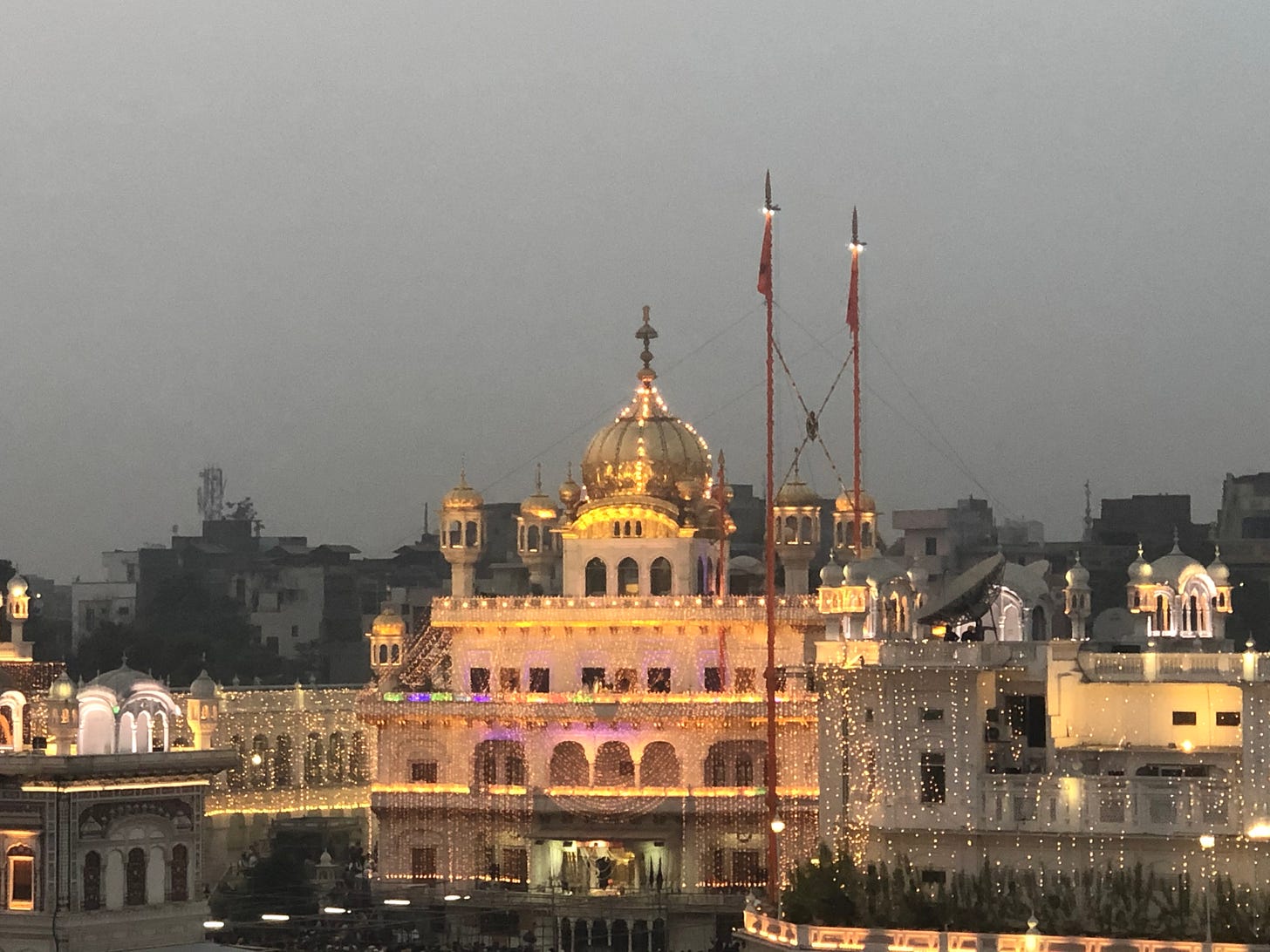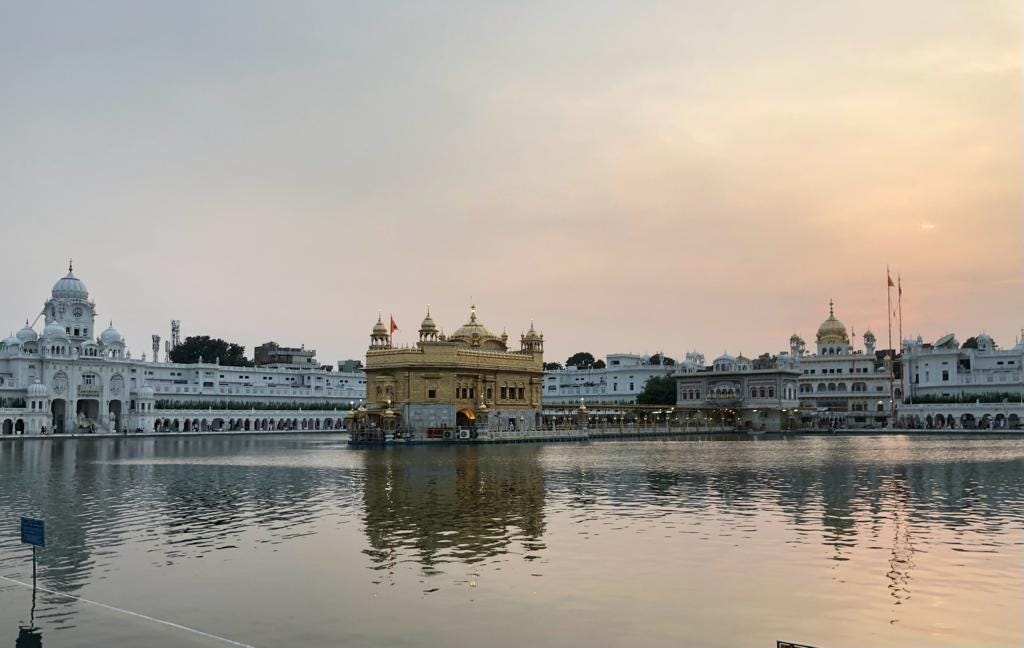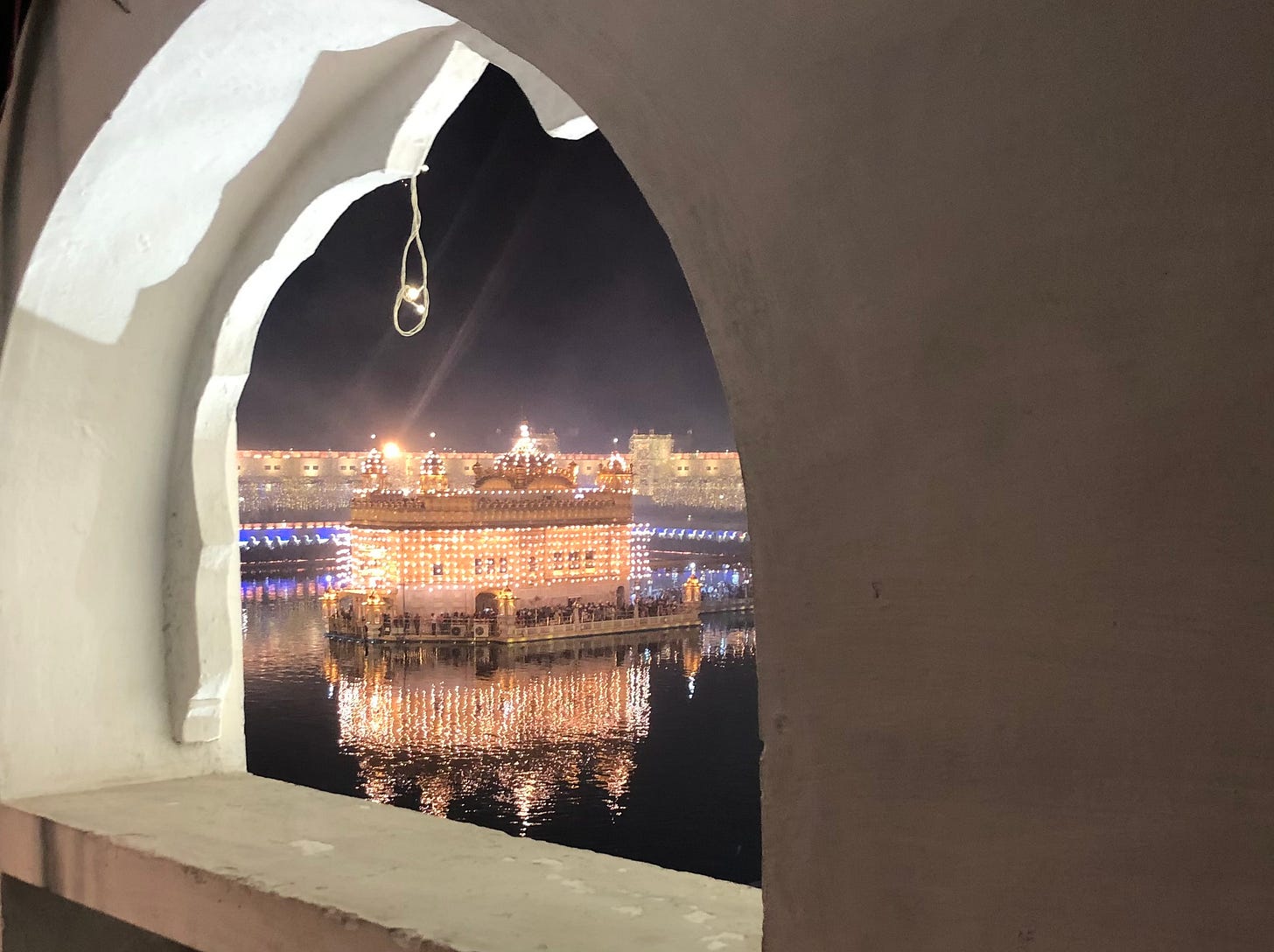Magh Sangrand (ਮਾਘ ਸੰਗਰਾਂਦ): Maghi Mela at Muktsar Honouring the Legacy of the 40 Muktas
Bārah Māhā (ਬਾਰਹ ਮਾਹਾ) & the Spiritual Quest in the month of Magh (ਮਾਘ ).
Bārah Māhā and the Spiritual Essence of Magh
Introduction to Bārah Māhā in the Month of Magh
The Bārah Māhā (ਬਾਰਹ ਮਾਹਾ), a profound spiritual composition by Sri Guru Arjan Dev Ji, is an integral part of the Sri Guru Granth Sahib, spanning from Angs 133 to 136. This revered text is traditionally recited during Sangrand, signaling the onset of a new month. It serves as a spiritual compass, guiding devotees through the soul’s journey across various seasons, with each month revealing distinct spiritual themes that mirror the human soul's emotional and spiritual states amidst the ever-changing patterns of weather and nature.
Magh: A Time of Spiritual Introspection and Commemoration
Magh: A Time for Reflection and Spiritual Warmth
As we step into Magh (ਮਾਘ), the coldest part of the year in the Indian and Nanakshahi Sikh calendars, Bārah Māhā takes on a profound, contemplative significance. In this segment of the text, Guru Arjan Dev Ji uses vivid and evocative imagery to illustrate the soul-bride’s yearning for union with the Divine—a metaphor for humanity's spiritual quest. The physical coldness of Magh serves as a poignant contrast to the soul’s inner quest for warmth, enlightenment, and connection with the Creator. Magh Sangrand also coincides with the Maghi Mela at Sri Muktsar Sahib, commemorating the 40 Muktas who exemplified devotion and redemption.
The teachings of Sri Guru Arjan Dev Ji during Magh emphasize the necessity of internal reflection and the strengthening of one's connection with the Divine, transcending the harshness of the external environment. This month becomes a metaphorical phase for deep meditation and spiritual fortification.
Those keen to jump directly to the Punjab-English YouTube video that I recorded on this occasion, three years ago, may like to follow the link.
The Battle of Khidrana: A Saga of Sacrifice and Redemption
The Battle of Khidrana, also known as the Battle of Muktsar, is a defining moment in Sikh history, embodying the virtues of devotion, sacrifice, and redemption. Fought on December 29, 1705, near the dhab (pool) of Khidrana, this confrontation saw 40 Sikh warriors, led by Mahan Singh and inspired by Mai Bhago, return to fight for Guru Gobind Singh after previously deserting him during the siege of Anandpur. Vastly outnumbered by a Mughal army of 10,000 under Wazir Khan, these warriors displayed unmatched bravery, inflicting heavy losses on the enemy and forcing their retreat. Their selfless sacrifice allowed Guru Gobind Singh to safely continue his mission, underscoring their spiritual awakening and loyalty.
Redemption and Liberation at Muktsar
In the aftermath of the battle, Guru Gobind Singh combed the battlefield for survivors and found Mahan Singh, gravely wounded but alive. In a moment of profound significance, Mahan Singh begged the Guru to tear up the ‘bedawa’ (letter of desertion) they had once signed. Deeply moved, Guru Gobind Singh tore the document, forgiving the warriors and conferring upon them the title of "Muktas," or the liberated ones. The Guru honored their sacrifice by personally performing their last rites and renaming the battlefield Muktsar, meaning "the pool of liberation." The names of these 40 martyrs remain etched in Sikh history, celebrated as eternal examples of courage and redemption.
Commemorating Magh: The Legacy of the Muktas
The story of the 40 Muktas resonates as a timeless lesson in faith, sacrifice, and the transformative power of redemption. It demonstrates that even those who falter can attain spiritual liberation through selfless courage and devotion. The annual Maghi Mela, observed generally on January 14th, corresponding to the first day of Magh in the Nanakshahi calendar, commemorates their unparalleled valour. Held at Sri Muktsar Sahib, the event draws thousands of devotees who pay homage to these martyrs and reflect on their enduring legacy. The battle's connection with the month of Magh reinforces its spiritual significance, inspiring Sikhs to embody the virtues of devotion and sacrifice in their own lives.
Magh’s Teachings: A Journey of Inner Renewal
In the verses of Magh in Bārah Māhā, the emphasis is on introspection and spiritual cleansing. This month is a call to confront and transcend our ego and material attachments. As the cold of Magh reaches its peak, the teachings lead us on a metaphorical journey of the soul, urging us towards enlightenment and self-realization amidst life's more challenging periods. These teachings, rich in symbolism and depth, offer solace and insight, inspiring an understanding that goes beyond their literal meaning, touching the heart with reverence and a renewed sense of spiritual awakening.
In embracing the teachings of Magh, as outlined in Bārah Māhā, and commemorating the legacy of the 40 Muktas at Sri Muktsar Sahib, devotees find a unique blend of spiritual and historical consciousness, reinforcing the enduring values of faith, sacrifice, and devotion in Sikhism.
In Magh: The Divine Embrace of Reflection and Spiritual Renewal
Le us see the translation for each verse:
ਮਾਘਿ ਮਜਨੁ ਸੰਗਿ ਸਾਧੂਆ ਧੂੜੀ ਕਰਿ ਇਸਨਾਨੁ ॥
Māgẖ majan sang sāḏẖū▫ā ḏẖūṛī kar isnān.
In the month of Magh, let your cleansing bath be the dust of the Saadh Sangat, the Company of the Holy.
ਹਰਿ ਕਾ ਨਾਮੁ ਧਿਆਇ ਸੁਣਿ ਸਭਨਾ ਨੋ ਕਰਿ ਦਾਨੁ ॥
Har kā nām ḏẖi▫ā▫e suṇ sabẖnā no kar ḏān.
Meditate and listen to the Name of the Lord, and give it to everyone.
ਜਨਮ ਕਰਮ ਮਲੁ ਉਤਰੈ ਮਨ ਤੇ ਜਾਇ ਗੁਮਾਨੁ ॥
Janam karam mal uṯrai man ṯe jā▫e gumān.
In this way, the filth of lifetimes of karma shall be removed, and egotistical pride shall vanish from your mind.
ਕਾਮਿ ਕਰੋਧਿ ਨ ਮੋਹੀਐ ਬਿਨਸੈ ਲੋਭੁ ਸੁਆਨੁ ॥
Kām karoḏẖ na mohī▫ai binsai lobẖ su▫ān.
Sexual desire and anger shall not seduce you, and the dog of greed shall depart.
ਸਚੈ ਮਾਰਗਿ ਚਲਦਿਆ ਉਸਤਤਿ ਕਰੇ ਜਹਾਨੁ ॥
Sacẖai mārag cẖalḏi▫ā usṯaṯ kare jahān.
Those who walk on the Path of Truth shall be praised throughout the world.
ਅਠਸਠਿ ਤੀਰਥ ਸਗਲ ਪੁੰਨ ਜੀਅ ਦਇਆ ਪਰਵਾਨੁ ॥
Aṯẖsaṯẖ ṯirath sagal punn jī▫a ḏa▫i▫ā parvān.
Be kind to all beings - this is more meritorious than bathing at the sixty-eight sacred shrines of pilgrimage and the giving of charity.
ਜਿਸ ਨੋ ਦੇਵੈ ਦਇਆ ਕਰਿ ਸੋਈ ਪੁਰਖੁ ਸੁਜਾਨੁ ॥
Jis no ḏevai ḏa▫i▫ā kar so▫ī purakẖ sujān.
That person, upon whom the Lord bestows His Mercy, is a wise person.
ਜਿਨਾ ਮਿਲਿਆ ਪ੍ਰਭੁ ਆਪਣਾ ਨਾਨਕ ਤਿਨ ਕੁਰਬਾਨੁ ॥
Jinā mili▫ā parabẖ āpṇā Nānak ṯin kurbān.
Nanak is a sacrifice to those who have merged with God.
ਮਾਘਿ ਸੁਚੇ ਸੇ ਕਾਂਢੀਅਹਿ ਜਿਨ ਪੂਰਾ ਗੁਰੁ ਮਿਹਰਵਾਨੁ ॥੧੨॥
Māgẖ sucẖe se kāʼndẖī▫ah jin pūrā gur miharvān. ||12||
In Magh, they alone are known as true, unto whom the Perfect Guru is Merciful. ||12||
These verses reflect the profound spiritual teachings for the month of Magh, emphasizing the importance of inner purity, devotion, and the grace of the Guru.
As we conclude the verses of Magh, our journey through this spiritually profound month has immersed us in a landscape rich in contemplation and spiritual renewal. Guru Sahib's teachings in Magh stress the necessity of introspection, enhancing our devotion, and reinforcing our connection with the Divine. With the onset of Magh, we experience the peak of winter's severity, marking a transition from the milder previous months. This shift beckons our souls to combine meditative introspection with a deep, devout embrace of the Divine. In the profound quiet of winter, our spirits are encouraged to remain fervently devoted to seeking the Divine.
May the wisdom imparted in Magh inspire and guide us as we continue our unceasing pursuit of spiritual enlightenment.

Each Month Offers a Unique Opportunity: The Essence of Magh
Traversing the spiritual landscapes sketched by Guru Arjan Dev Ji, we have observed the soul, depicted as a soul-bride, in her relentless quest for Divine union. This continual interplay of detachment from the material world and the gravitation towards spiritual realms serves as a poignant reminder of the fleeting nature of worldly pleasures in contrast to the enduring radiance of Divine love. The repeated theme of seeking Guru Ji's grace stands as a pivotal spiritual directive and the bedrock of our spiritual odyssey.
With this spiritual guide at our side, as we approach the month of Magh, those in pursuit of spiritual enlightenment, eager for an all-encompassing understanding of the Bārah Māhā (ਬਾਰਹ ਮਾਹਾ), will find great value in the succinct yet profound narrations of each month. Magh, in particular, offers a distinct perspective on the soul's journey – a time for deeper reflection and consolidation of our devotion to the Divine.
Every Moment: Illuminated by Divine Grace in Magh
As we journey through the verses for Magh by Guru Arjan Dev Ji, we encounter a profound understanding of the ubiquity of divine grace in our lives. Magh, with its intense cold and the peak of winter, sets a unique spiritual scene that deeply resonates with our emotional and spiritual states. However, Guru Sahib enlightens us that true spirituality extends beyond these seasonal changes. Each heartbeat and breath in Magh, just as in other months, can be filled with divine closeness if we align our souls appropriately. The arrival of winter's pinnacle in Magh symbolizes more than a change in time; it represents a metaphor for life’s continuous journey, offering each moment as a chance to connect with the Divine.
In Magh, no single moment is exclusively earmarked for divine reflection, seeking the Guru's wisdom, or engaging in spiritual communion. Instead, every instant in Magh can become a channel for divine connection when approached with heartfelt love, unwavering devotion, and earnest intention. Those graced by God find each moment of Magh to be of deep spiritual importance. Rooted in their faith and undistracted by the material world, they understand that the true route to spiritual enlightenment transcends temporal constraints, founded on a continuous devotion to the Divine.
ਜਿਨਿ ਜਿਨਿ ਨਾਮੁ ਧਿਆਇਆ ਤਿਨ ਕੇ ਕਾਜ ਸਰੇ ॥ Those who meditate on the Divine Name, their tasks are fulfilled.
ਹਰਿ ਗੁਰੁ ਪੂਰਾ ਆਰਾਧਿਆ ਦਰਗਹ ਸਚਿ ਖਰੇ ॥ Those who worship the perfect Guru and Lord, stand true in the divine court.
ਸਰਬ ਸੁਖਾ ਨਿਧਿ ਚਰਣ ਹਰਿ ਭਉਜਲੁ ਬਿਖਮੁ ਤਰੇ ॥ All comforts are in the Lord's feet; they cross the treacherous world-ocean.
ਪ੍ਰੇਮ ਭਗਤਿ ਤਿਨ ਪਾਈਆ ਬਿਖਿਆ ਨਾਹਿ ਜਰੇ ॥ They attain love and devotion, and worldly temptations don't affect them.
ਕੂੜ ਗਏ ਦੁਬਿਧਾ ਨਸੀ ਪੂਰਨ ਸਚਿ ਭਰੇ ॥ Falsehood departs, duality is dispelled, and they are filled with the complete Truth.
ਪਾਰਬ੍ਰਹਮੁ ਪ੍ਰਭੁ ਸੇਵਦੇ ਮਨ ਅੰਦਰਿ ਏਕੁ ਧਰੇ ॥ They serve the Supreme Lord and enshrine the One God within their hearts.
ਮਾਹ ਦਿਵਸ ਮੂਰਤ ਭਲੇ ਜਿਸ ਕਉ ਨਦਰਿ ਕਰੇ ॥ Every month, day, and moment is auspicious for those upon whom He casts His Glance of Grace.
ਨਾਨਕੁ ਮੰਗੈ ਦਰਸ ਦਾਨੁ ਕਿਰਪਾ ਕਰਹੁ ਹਰੇ ॥14॥1॥ Nanak begs for the gift of divine vision; O Lord, shower Your Grace.
The Timeless Spiritual Union: Transcending Celestial Cycles
In the concluding verses, Guru Arjan Dev Ji reveals a central tenet that acts as the cornerstone of spiritual evolution. Moving beyond the prevalent cultural emphasis on astrologically auspicious moments, he accentuates that genuine spiritual moments are not determined by starry configurations but by the encompassing Grace of the Divine. As Guru Sahib elucidates, each tick of the clock is sacred—whether day or night, regardless of the month or season—when illuminated by the benevolent embrace of the Divine. This isn't a deviation from the preceding verses; it's a profound reaffirmation of their intrinsic message: every fleeting moment is imbued with the potential for spiritual ascension and divine communion.
Guru Ji's earnest prayer, "Nanak craves the gift of divine vision; O Lord, shower Your Grace," stands as a heartfelt reminder for all of humanity. It underscores the essence of actively yearning for that Divine connection, rather than idly awaiting a so-called 'auspicious' time. This fervent call inspires every seeker to cherish each passing moment, perceiving each juncture as a 'shub karaj'—a propitious occasion for noble endeavors. At its core, this is the epitome of a life infused with spiritual consciousness, where the mundane is elevated to the divine, not by celestial orchestration, but through the soul's harmonious alignment with the vast infinite.
Reflecting and Looking Forward
In the intricate tapestry of existence, each individual strand—every fleeting instance—holds the potential to radiate with divine luminescence. It isn't the celestial alignments that sanctify a moment, but the sanctum within our hearts, illuminated by unwavering faith and reverence.
As various political parties, including the Shiromani Akali Dal, prepare to hold their rallies at Muktsar on this solemn occasion, it becomes imperative for every Sikh—be it a prominent leader or an ordinary party worker—to introspect deeply. They must question whether they have fully adhered to the Hukamnama issued on December 2 from Sri Akal Takht or whether they stand in breach, circumvention, or casual disobedience of it. If the latter is true, they forfeit both the moral and religious right to be present at Muktsar during this time, effectively having already sent their 'bedawa' to the Guru.
This is a sacred occasion and place to honour the legacy of the 40 Muktas. Those who are 'bemukh' to the Guru will only diminish their respect and credibility by making an appearance here, while also risking the divine wrath of Sri Guru Gobind Singh Ji. Let this Maghi be a moment of true introspection and renewal, where every Sikh commits to embodying the values of faith, devotion, and sacrifice that the Muktas so valiantly upheld.
ਵਾਹਿਗੁਰੂ ਜੀ ਕਾ ਖਾਲਸਾ,
ਵਾਹਿਗੁਰੂ ਜੀ ਕੀ ਫਤਿਹ।











🙏🙏🙏🙏🙏